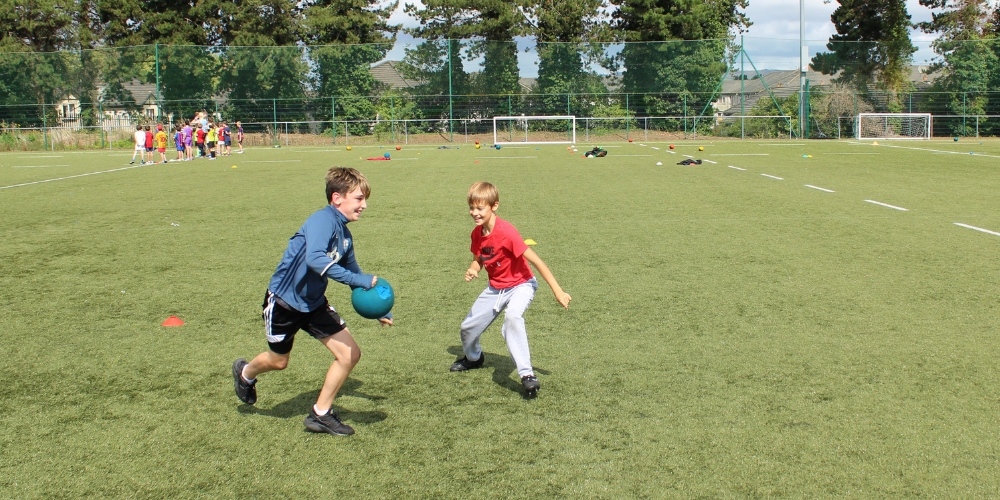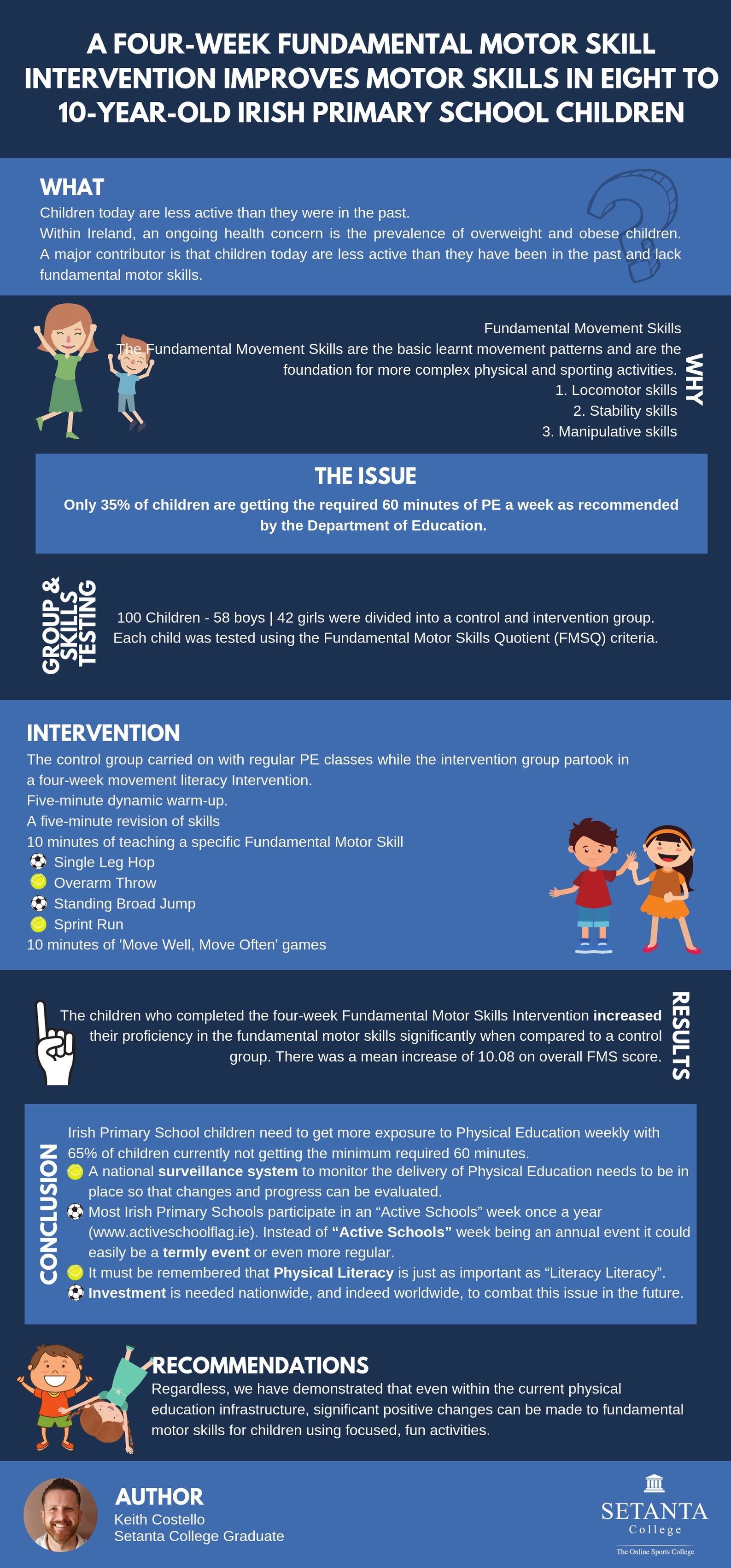Research Title: A four-week fundamental motor skill intervention improves motor skills in eight to 10-year-old Irish primary school children.
Introduction:
Fundamental motor skills are important in the long-term development of children physically, socially and cognitively. [1] The Fundamental Movement Skills are the basic learnt movement patterns that do not occur naturally and are suggested to be foundational for more complex physical and sporting activities. [2] These skills are generally broken into three categories:
- Locomotor skills – such as walking, running, hopping, skipping, jumping, dodging and sidestepping.
- Stability skills – such as Balancing and landing.
- Manipulative skills – such as catching, throwing, kicking, the underarm roll and striking.
Within Ireland, an ongoing health concern is the prevalence of overweight and obese children. While poor nutrition may play a role in obesity [3] another important contributor is that children today are less active than they have been in the past [4]. A potential reason for this lack of activity is because children lack fundamental motor skills [5]. A study by David Lubans maintains that the mastery of fundamental motor skills contributes not just to a child’s physical development but also to their cognitive and social development, as well as providing the foundation for an active lifestyle.
Some believe that if the fundamental motor skills are not mastered between the ages of eight and 11 for boys and nine to 12 for girls, the ability of the young child to reach their full potential may be compromised [6]. Therefore, if we can teach fundamental motor skills to young children we not only give them the confidence and skills to take part in physical activity and sport [7], but we may also help in combating obesity and the related risk of disease in later life [8].
Whilst there is a need for FMS development through all juvenile age groups we are at a potential crisis point for children of this age (eight to 10 years old), to be exposed to opportunities to develop Fundamental Motor Skills [9] and hence the focus on this age group in the present study. Timetabled Physical Education (PE) lessons throughout the school year in a suitable facility (hall/playground) are an ideal opportunity to improve these skills.
Thus, the aim of the present study was to determine if a four-week instructed fundamental motor skills intervention, applied in two 30-minute sessions, is effective in improving fundamental motor skills in Irish school male and female children between eight and 10 years of age, when compared to a control group.
Materials and Methods:
A total of 100 third- and fourth-class Primary School children participated in the study. This was made up of 58 boys and 42 girls with an average age of 9. Following an explanation of the testing procedures, the 100 children were divided into a control group and an intervention group. Each child’s proficiency in the Fundamental Movement Skills was assessed using the Fundamental Motor Skills Quotient (FMSQ) criteria which has been shown to be a valid measure of motor competence in young children [10] (Table 1).
Skills tested included:
- Single Leg Hop
- Overarm Throw
- Standing Broad Jump
- Sprint Run
Following testing, the control group partook in their normal Physical Education classes for the next 4 weeks. This consisted of two 30-minute classes a week while the intervention group partook in a four-week movement literacy intervention. Each lesson for the intervention group focused on specific fundamental motor skill and began with a five-minute dynamic warm-up. A five-minute revision of skills learned from previous lessons followed this. This was followed by 10 minutes of teaching the specific Fundamental Motor Skill being taught that week, namely the criteria in Table 1.

Table 1: Skills Criteria for each Fundamental Motor Skill. R = Right, L = Left (Hands & McIntyre 2015). A point is given for each criteria that is deemed present.
The PDST (Professional Development Services for Teachers) lists a number of games from the ‘Move Well, Move Often’ Physical Literacy Program [11]. Each lesson finished with 10 minutes of these games which are designed to improve children’s fundamental motor skills. At the end of the 4 weeks, both groups were then re-tested for FMSQ.
Results:
The primary outcome of the present study is that children who completed the four-week Fundamental Motor Skills Intervention increased their proficiency in the fundamental motor skills significantly when compared to a control group.
Specifically, we noted a mean increase of 10.08 on overall FMS score when we examine the effectiveness of the intervention. The study is novel as, to the author’s knowledge, no other research has been done on Irish Primary School children of this age assessing if a four-week Physical Literacy Intervention will improve their proficiency in the fundamental motor skills. The fact the children’s P.E. lessons for the week were modified, as opposed to adding additional physical activity sessions/lessons or completely changing the Physical Education Curriculum, shows not only the effectiveness of the intervention but also the possibility that such an intervention could be introduced to other Primary Schools quite easily.
Recommendations:
-
- The Department of Education and Skills in Ireland recommends that children get 60 minutes a week of Physical Education. However, just 46 minutes was found to be the average time spent in Physical Education and in fact only 35% of children are getting the required 60 minutes a week as recommended. Therefore, Irish Primary School children need to get more exposure to Physical Education weekly.
- Given the links between fundamental motor skills and numerous factors, such as lifelong physical activity [12], sports participation and competence [13], and obesity to name a few. A national surveillance system to monitor changes in Physical Education needs to be in place so that changes and progress can be evaluated [14].
- Most Irish Primary Schools participate in an “Active Schools” week once a year (www.activeschoolflag.ie). During this week class teachers make a far greater effort to get their children active, whether it is participating in the “Daily Mile” challenge, 30 seconds of activity such as jogging on the spot in between lessons or adding a physical activity element to the homework such as star jumps or laps of the garden. Instead of “Active Schools” week being an annual event it could easily be a termly event or even more regular. It must be remembered that Physical Literacy is just as important as “Literacy Literacy”.
- Investment is needed nationwide, and indeed worldwide, to combat this issue in the future. Regardless, we have demonstrated that even within the current physical education infrastructure, significant positive changes can be made to fundamental motor skills for children using focused, fun activities. [15] [16]



Leave A Comment